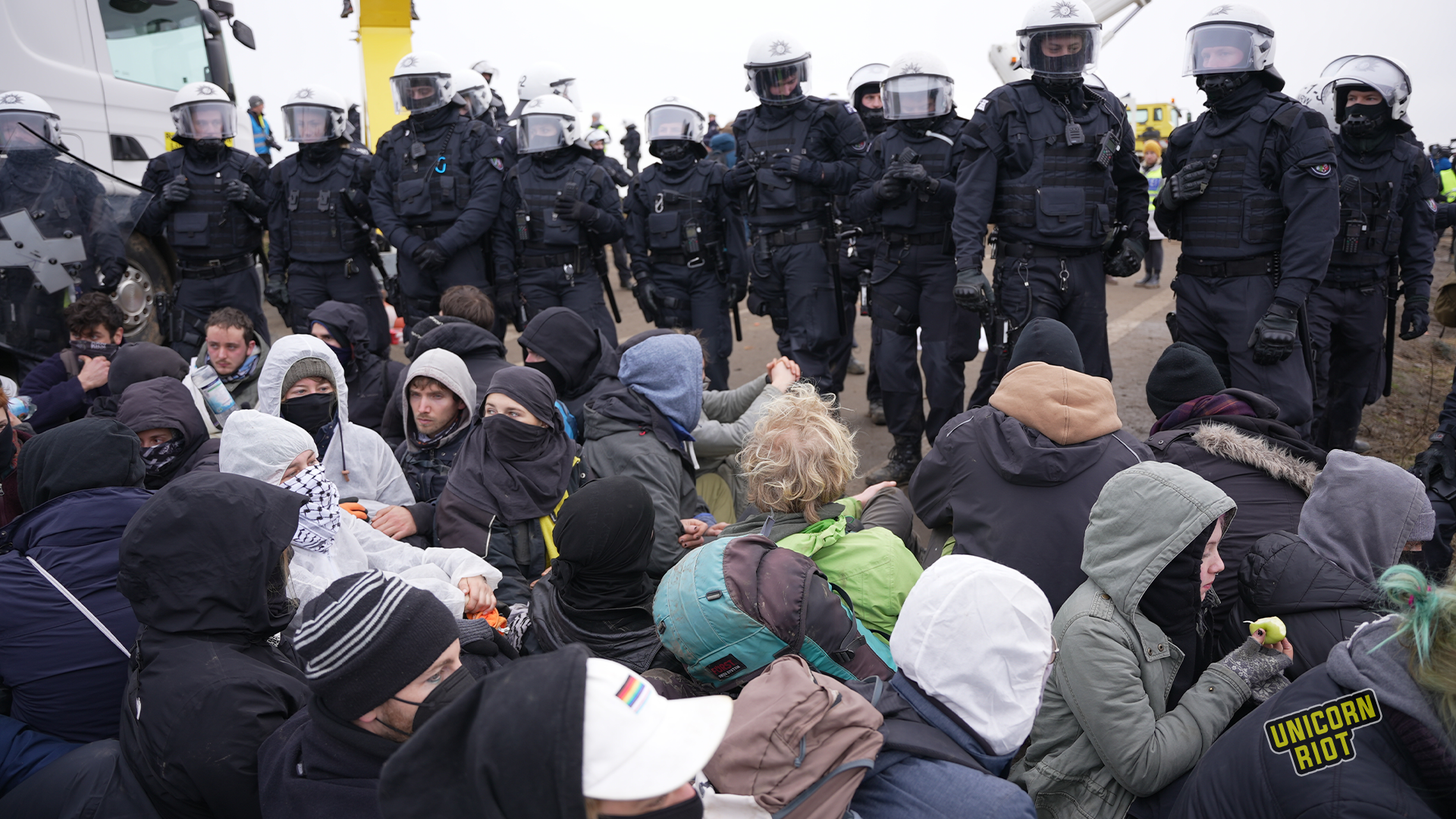Police Evict Environmental Protesters from Lützerath, Germany
Lützerath, Germany – It was just after seven o’clock when someone called into the barn and said that supporters were needed at the village entrance barricade as the police were massing forces. Inside the barn, which had been converted into a sleeping hall, countless activists were sleeping. Some got up and slowly got ready. Others turned over again and fell back to sleep. A few minutes later, another voice said: “People, a big alarm has been sounded.” Suddenly everyone was fully awake. Everyone packed up their sleeping bags and backpacks. It was clear to everyone that the moment of eviction had come.
Outside it was raining and still dark. Only police searchlights cast their light over the area. The barn is just around the corner from the first barricade. Activists are already posted on the ramparts in front of it, forming a line. Across the street, hundreds of police have gathered. They draw several lines in front of the entrance and more units are positioned left and right all around the village.
At a point a short distance further to the left that is only slightly protected by a fence (seen from the inside), Operation Evacuation of Lützerath begins. A group of police enter the path in front of the village. At the same time, police attacked at several points, violently dragging people down from the rampart in front of the barricade. Some of the activists were rounded up and kettled. Meanwhile, others retreat and continue to resist eviction in the village surrounded by trees and paths. Others are already in their lock-ons or tree houses.
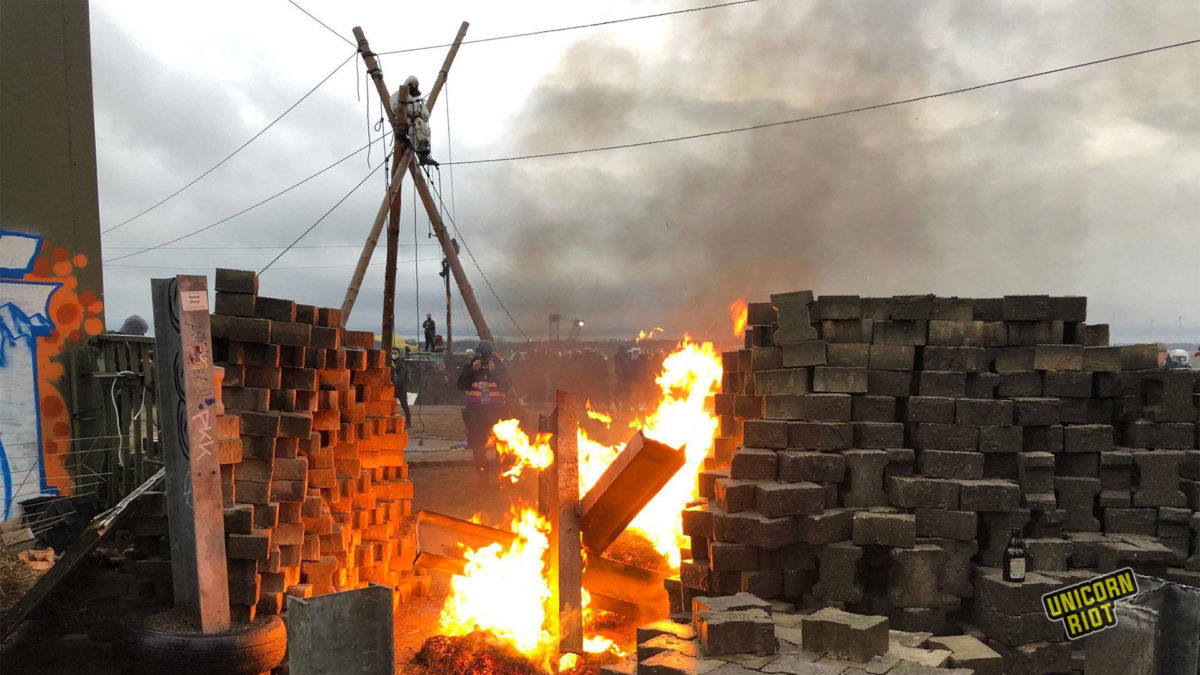
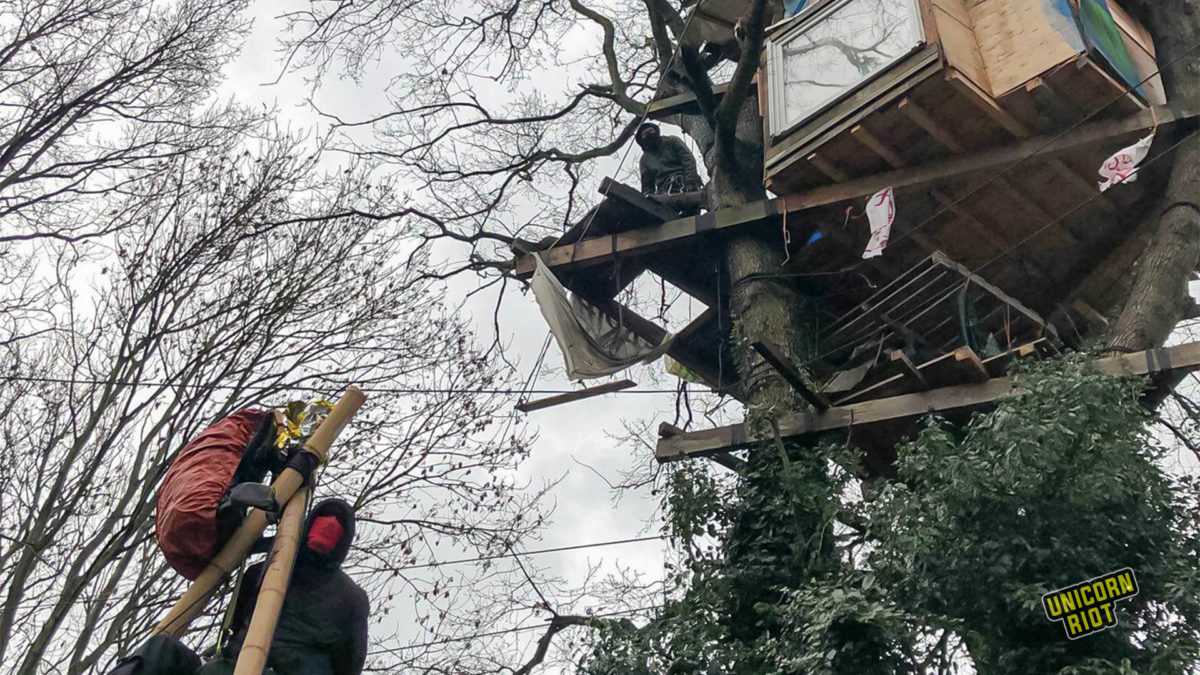
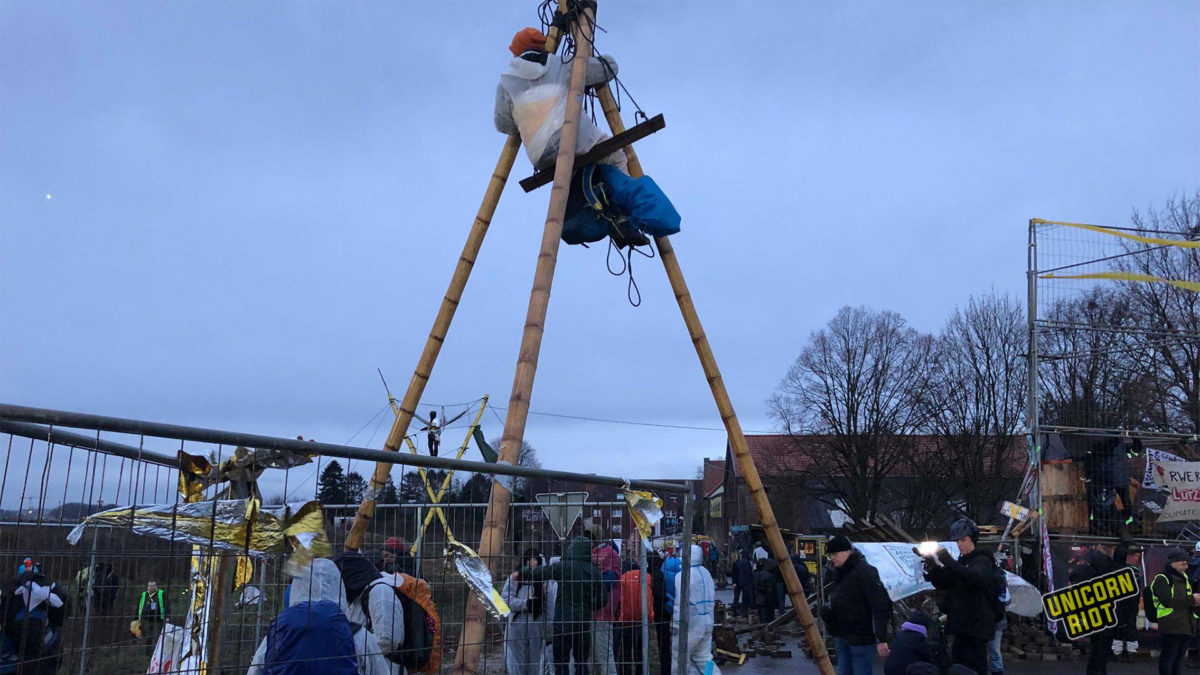
Amidst heavy rain and dreary weather, the police eviction that started on Wednesday, Jan. 11, has continued for several days with police reporting that 470 people were removed from the site, “320 voluntarily and 150 after police measures.” Despite the majority of land defenders being pushed out, pockets of activists remain in hard-to-reach locations like treehouses, hanging between trees, and tunnels below the village. All of which were cleared by Sunday night, aside from two activists in the tunnel.
Activists stated they had achieved their goal of holding the occupied village at least until the large demonstration that was held on Saturday. This demonstration was organized by several local NGO’s in nearby Keyenberg — one of the five villages saved from demolition last year after a concerted direct action campaign by “All Villages Remain.”
Background to Eviction
Lützerath is a village in a rural corner of western Germany. It has been occupied by protesters since 2020, when the multi billion-dollar energy company, Rheinisch-Westfälisches Elektrizitätswerk Aktiengesellschaft (RWE AG) announced that it would demolish it and dig up the lignite underneath. Lignite, often referred to as “brown coal” is a type of fuel used for electric power generation. While it is already well known that the use of coal to generate electricity is a major contributor in the ongoing climate crisis, lignite power generation is particularly dangerous due the exceptionally high levels of carbon dioxide and sulfur it releases in the atmosphere.
In response the activists built tree houses and announced they will hold out there until the preservation of the village is secured. Lützerath quickly became a symbol of the German climate change movement and a place of collective living and learning – a utopia in the here and now.
Lützerath lies directly on the edge of the dystopian Garzweiler open-cast mine in the Rhenish lignite mining region. The village is to be destroyed to make way for the expansion of the open-cast mine, and the inhabitants have already been resettled. Since the end of the Second World War, a total of 300 places in Germany have been devastated by lignite mining and more than 120,000 people have been resettled. An area of about 1,000 km2 has been irretrievably destroyed. In addition, activists believe that the German government is “are not taking the necessary measures to comply with the 1.5 degree target of the Paris Agreement.”
In the days before the eviction, police, with the support of RWE, carefully prepared for the upcoming operation. Small confrontations had already started in the first days of January, culminating in the first evictions of tripods and monopods held by activists.
Many environmentalists across the globe have used erecting tripods and monopods made of wood planks about 15 feet long as a tactic of direct action. When the pods are erected, activists experienced in climbing hang from them, making it difficult to evict them. Activists in Lützerath regularly defend the structures with sitting blockades. One such tripod was erected in front of the police line within seconds before the police could react on the day before the eviction.
Police Eviction Commences
As the forefield eviction was underway, a Greenpeace truck was on site building a massive blockade point. In front of it, a big yellow X (the symbol of resistance since the historical protests against nuclear transports which has been used a lot in the protests of Lützerath). Atop the truck sat a land defender.
“The police were present today with massive forces and tried to clear the outskirts of the village. We are here so that Lützerath can’t be evacuated. We want to preserve Lützerath. Above all, we want the coal under Lützerath not to be mined.”
Greenpeace activist
The first phase of the eviction, the invasion of the police into the village, happened fast and violently with activists at the barricades outnumbered by the huge number of state forces. The second phase, clearing the village, has taken a bit longer. On the first day of the eviction police managed only to evict people from a part of the village and encampments.
While speaking to Unicorn Riot about the eviction, Mara Sauer, spokesperson for Lützerath Lives, criticized the police for “not holding their promise not to evict the public kitchen set up in the village.”
“The eviction makes you so incredibly angry at a system that makes it possible for single companies like RWE to make so much money by destroying our living bases.”
Mara Sauer, spokesperson of Lützerath Lives
Activists Respond
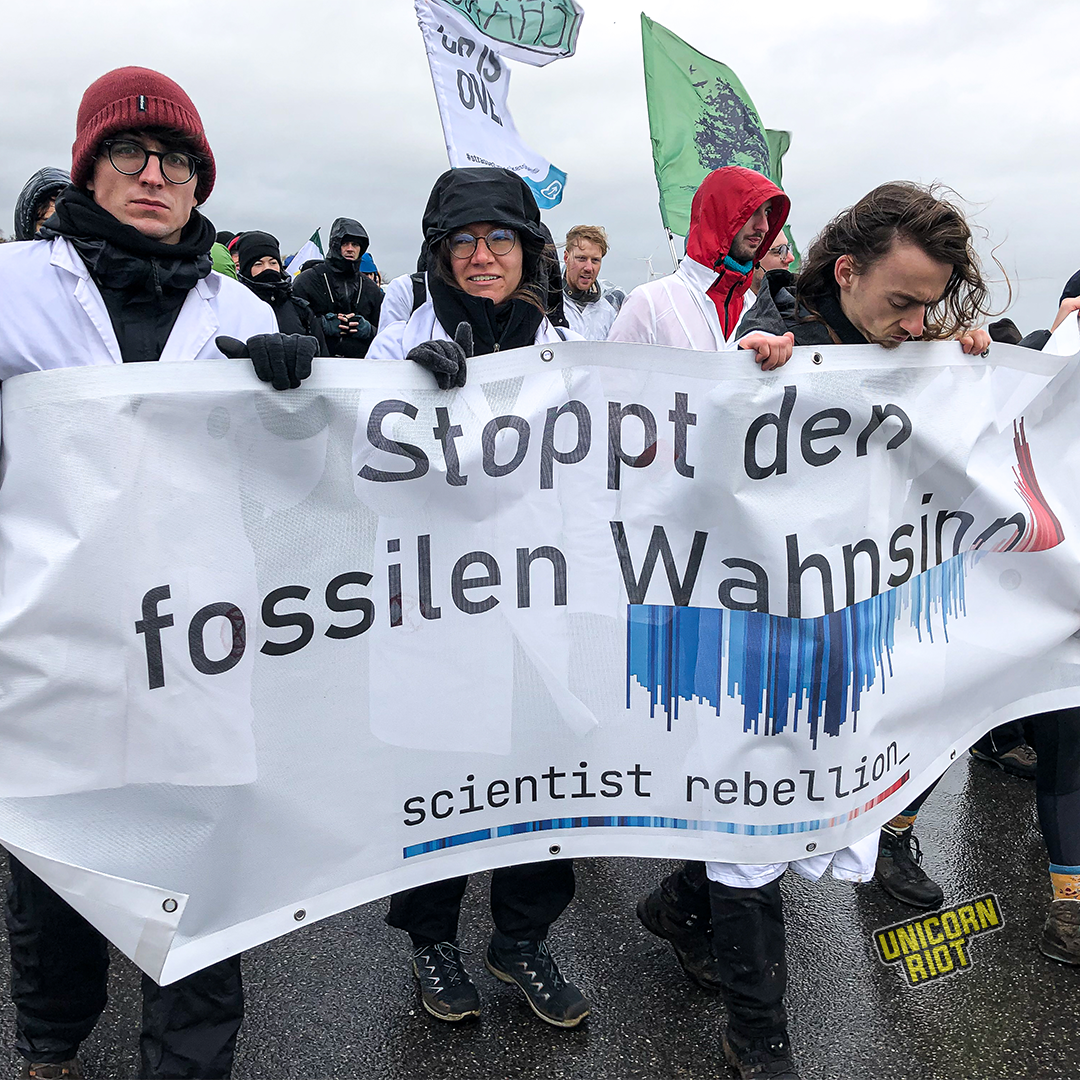

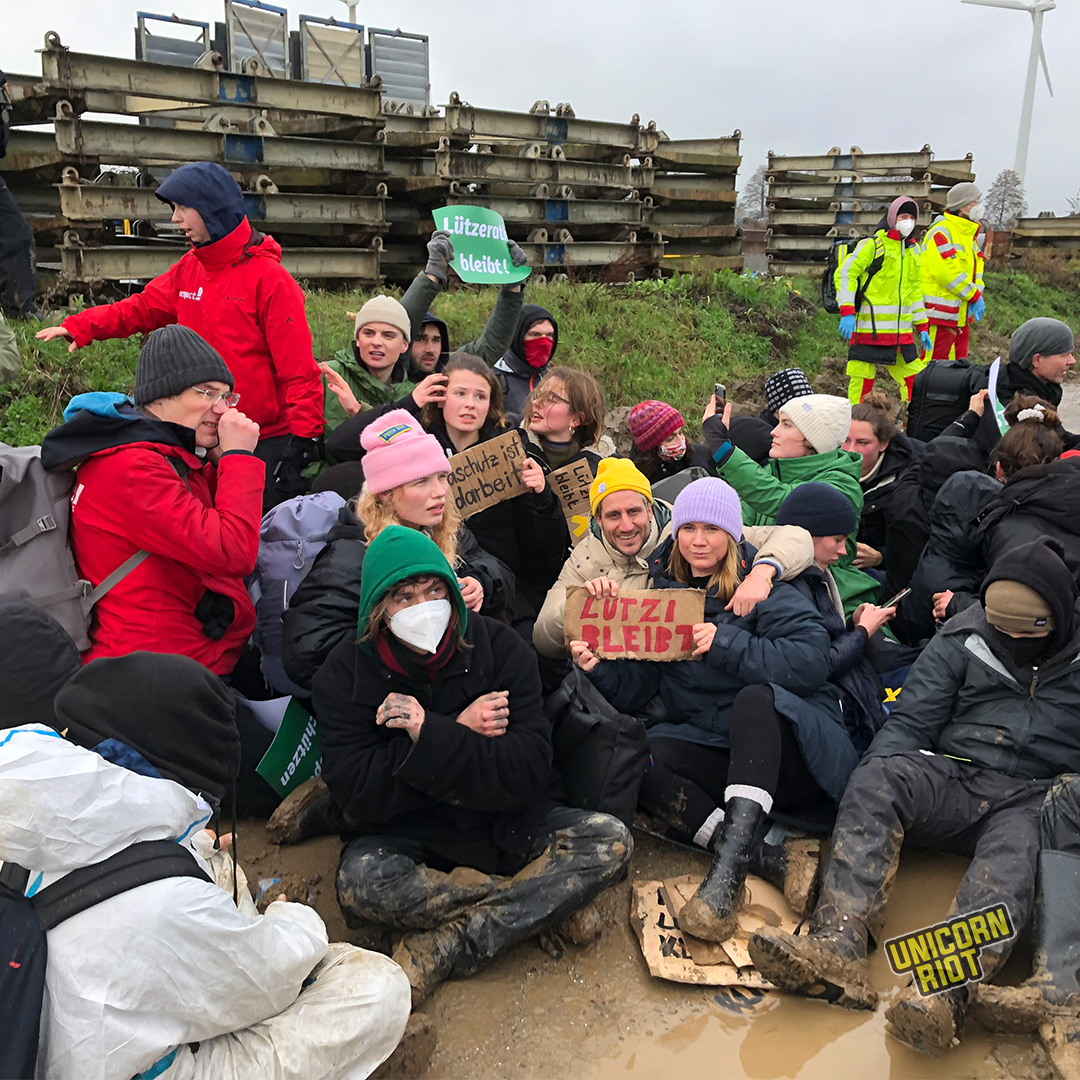
In the two days following the eviction protesters from a nearby activist camp in the village of Keyenberg attempted several times to outrun police lines on the way to Lützerath. For example on Thursday 12th January hundreds broke out of an official demonstration and managed to establish sitting blockades on a field path leading directly into Lützerath.
Several large NGOs and organizations called for a massive demonstration near Lützerath on Saturday, Jan. 14. Over 35.000 people came to listen to the speech of Swedish climate activist Greta Thunberg and to make clear that Lützerath is here to stay.
During the rally, thousands of people stormed the first police line, some used bengal flares and stones, breaking through the line and arriving at the next police line which was directly at the border fence (constructed by RWE in the previous days) of the village.
As protesters neared the lines, activists holding out in occupied treehouses greeted them with fireworks. The police reacted violently by relentlessly beating people to the ground with their clubs and risking severe injuries. According to “Lützerath Lives,” numerous people were reported injured, some of them seriously. Among them at least one dog bite and one who was rendered unconscious, severe head injuries, many broken bones, injuries from pepper spray, ambulance operations and one helicopter operation.
Activists from the alliance “Lützerath Unräumbar” (Lützerath unevictable) announced actions of civil disobedience plans for Tuesday, Jan. 17. Although the state managed to turn the activists’ occupation into a police occupation, the fight for Lützerath and climate justice seems far from being over. Continue to follow Unicorn Riot for more frontline reporting.
Follow us on X (aka Twitter), Facebook, YouTube, Vimeo, Instagram, Mastodon, Threads, BlueSky and Patreon.
Please consider a tax-deductible donation to help sustain our horizontally-organized, non-profit media organization:

Germany Anti-Coal Mine coverage:
- Mass Protests by Climate Activists Follow Eviction of Occupied German Village - January 30, 2023
- Police Evict Environmental Protesters from Lützerath, Germany - January 16, 2023
- Climate Activists Disrupt German Coal Mine Expansion - November 16, 2021
- Tree House Villages Defend Ancient German Forest Against Expanding Coal Mine - September 9, 2019
- Direct Action Shuts Down Coal Infrastructure in Germany - June 21, 2019
- Touring Activists Build Momentum Toward Climate Justice - May 8, 2019
- Journalist Dies During German Police Sweep of Hambach Forest - Sept. 19, 2018
- Police Move to Clear Activists from Ancient Forest on Behalf of Coal Mining Company - Sept. 13, 2018
- Networks of Resistance Pt. 1 – ZAD, Bure, Hambach Forest
- Direct Action Shuts Down Coal Mine in Germany (w/ Interview) – Deprogram Ep. 16 - August 21, 2015
